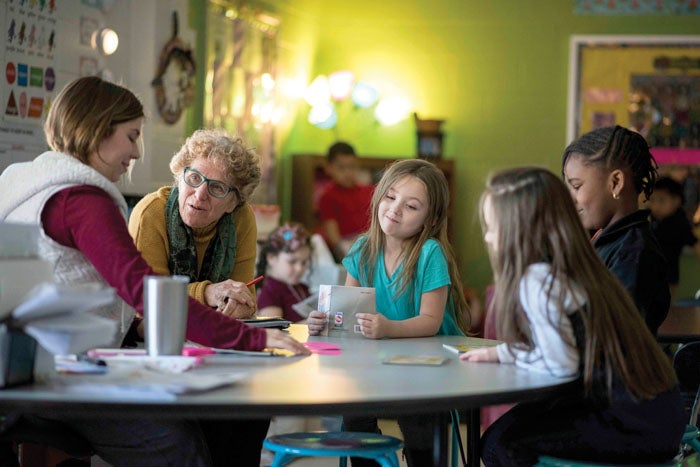Koontz: Teacher, student relationships key to overcoming trauma
Published 12:00 am Thursday, March 29, 2018

- Phyliss Post, a UNC-C professor and director of play therapy certificate, has been working with her college students and teachers at Eliz. Duncan Koontz Elementary school on using play therapy as a tool to teach teachers on observing student behaviors and better intervening and steering them to a more postive direction. Jon C. Lakey/Salisbury Post
SALISBURY — Sometimes, all it takes to change a child’s life is a relationship. Over the past year, Koontz Elementary School has been building a trauma-focused and resiliency program to help students who have experienced extreme difficulty in life.
One piece of that is a partnership with the Public School Forum of N.C., which is helping the school come up with strategies to combat adverse childhood experiences, or ACEs. The other is a new partnership with the University of North Carolina at Charlotte’s graduate play therapy program.
Over the next three years, graduate and doctoral students from UNC-Charlotte will work to train teachers to create solid relationships with their students in a way that helps build resiliency and decrease teacher stress.
“Our hope and dream is that we can help the teachers develop wonderful relationships,” said Phyllis Post, director of play therapy certification at UNCC.
Post said she started volunteering at Koontz in January 2017, just after the murder of 7-year-old Koontz student A’Yanna Allen. At first, Post worked with individual students in a temporary playroom, using play therapy principles to help them work through fear and grief. But she started to wonder if she could help more than one child at a time.
During a seminar on ACEs, Post said she was touched. A single ACE is enough to make life difficult for a child, and a score of four or more can have serious negative health and life outcomes — including a shorter lifespan.
“And I thought about the children I worked with at Koontz,” Post said. “… These children I worked with at Koontz had scores of 7, 8 — 6, 7, 8.”
So, with the blessing of the school system and funding from Fred Stanback, Post launched her program. The goal? Within three years, every teacher at Koontz will be trained in building positive child-teacher relationships.
A positive relationship with an adult has been shown to be the No. 1 intervention that can change a child’s life for the better.
“We can train parents in these skills, and we can train teachers in these skills and teachers can use them in their classrooms,” Post said.
The program launched in August with a focus on kindergarten teachers. During the fall, teachers would go to a playroom with a single child and learn relationship-building skills and strategies common to child-centered therapy. These things, Post said, help create an “open, accepting relationship” between teacher and student.
“The counselor has the goal of communication to the child, ‘I’m here, I hear you, I care about you,’” she said.
The teachers practice strategies such as limit setting, esteem building, returning responsibility to the child, self-regulation and how to make good decisions.
“And these are skills I think that teachers are dying to have,” Post said.
But that’s not the end of the training.
“The second phase is helping them generalize what they’ve learned in the playroom, with one child, in the classroom,” she explained.
The hope is that not only will this improve relationships in the classroom, but that it will also reduce teacher stress as students become more responsible and self-assured.
That second prong began in January, and teachers are already seeing an effect. School officials say kindergarten now has the lowest level of office referrals in the school — something that was not true earlier in the year.
“I’m seeing a difference with some of my kiddos already,” kindergarten teacher Kerrie Smith said.
When she first began implementing strategies in the classroom, Smith said, some of her students gave her weird looks.
“At first they were looking at me kind of funny, like, ‘What is she doing?” she remembered.
But soon, they adjusted. Smith said both she and her students are having fun with the approach. Post visits Smith and other teachers regularly to supervise and coach them through the process.
Next year, Post will train first- through third-grade teachers and finish up with fourth- and fifth-grade teachers the year after that. Once all the training is done, she plans to continue observing the school to see how the program pans out long-term.
While large-scale relationship-building training has been done before, as far as Post knows, none have spanned an entire school churning out multiple years of data.
“So this project is huge just from the research part of it,” she said.
The future is still uncertain — Post needs to get the project fully funded — but she hopes it will make a difference.
“We don’t know what’s going to happen,” she said. “… Our hope and dream is that we can help the teachers develop wonderful relationships”
Those interested in helping fund the project should contact Phyllis Post at ppost@uncc.edu or Koontz Elementary social worker Christina Lockhart at christina.lockhart@rss.k12.nc.us.
Contact reporter Rebecca Rider at 704-797-4264.




